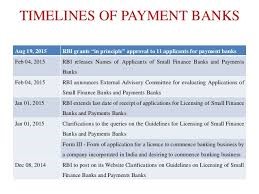Payment Banks License

Payment Banks License
Payment Bank are conceptualized by the Reserve Bank of India (RBI). The maximum deposits restricted to these types of Bank currently is INR 1 lakh per customer which shall be increased further. Both the current as well as savings account can be operated under such Bank. They can issue service relating to debit cards, online banking mobile banking and also ATM cards. Payment Bank also known as differentiated Bank shall be permitted to set up outlets (branches), ATMs, business correspondents, etc. but would be restricted to activities permitted to Bank under the Banking Regulation Act, 1949. Minimum paid up capital of payment bank shall be 100 crores.
Acts governed under payment Bank
- Companies Act, 2013.
- Banking Regulation Act, 1949.
- Reserve Bank of India Act, 1934.
- Foreign Exchange Management Act, 1999.
- Payment and settlement systems Act, 2007.
- Deposit Insurance and credit Guarantee corporation Act, 1961.
- Other applicable rules and regulations that may come from time to time.
The primary objective of payment Bank are to provide:
Small savings accounts payment/remittance services to labour workforce, low income households, unorganized sectors, small businesses, high volume low value transactions etc. Eligible players- Existing non-bank prepaid payment instrument under the Payment and settlement systems Act, 2007.(They can opt for conversion to payment bank).
- Individuals/professionals.
- NBFC's (non-banking finance companies).
- Business correspondents.
- Mobile telephone companies.
- Supermarket chains.
- Companies (public companies).
- Real sector cooperatives.
- Public sector entities.
The highlighting of payment Bank as follows

- Current deposits, saving bank deposits from individuals, small businesses are permitted up to a certain limit as prescribed.
- NRI deposits are not allowed/accepted.
- Issuance of ATM/Debit cards (although no credit cards).
- Internet banking services are open under payment bank. These Bank are expected to offer low cost banking solutions. (compliance of RBI instructions on internet banking, information security, electronic banking, technology risk management, cyber laws is necessary).
- payment bank can accept remittances as a channel (just like RTGS/NEFT/IMPS).
- payment Bank cannot take lending activities.
Procedure for payment Bank License

- Step
- Step
- Step
- Step
- Step
- Step
What We Offer
Packages & Pricing
6499
Basic
10000
Standard
19999
premium
FAQs For Private Limited Company Registration
LicenseHub - Copyright 2023. All rights reserved.
- Designed By-WebsApex

